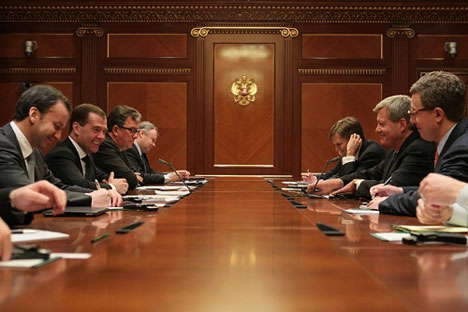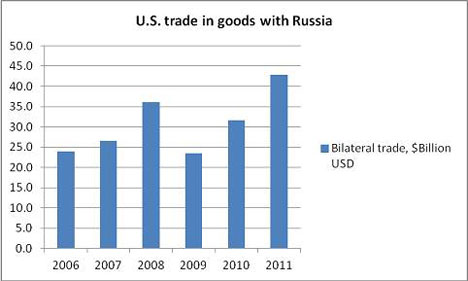
U.S. Ambassador in Russia Mikhail McFaul with politicians from Russia and USA. Source: m-mcfaul.livejournal.com
It’s the culmination of over 18 years of negotiations and hard work and brings one of the world’s largest economies rightly into the global rules-based trading system. The Obama administration has been a strong supporter and advocate of Russia’s WTO membership since President Obama took office. In my previous position at the White House, I worked closely with other senior members of our administration and the Russian government to complete the final negotiations on this accession agreement. These negotiations were tough, but successful, producing an outcome that is good for Russia, good for the United States, and good for the world economy. President Obama and our administration are pleased that our cooperation with Russia and other WTO Members has helped move the process toward this successful conclusion.
Russia and its trading partners will now be able
to benefit from the WTO rules that underlie open, free, transparent and
fair global economic competition. Predictable tariff rates and an
enforceable dispute resolution mechanism will give Russia and its
partners more certainty, and encourage deeper long-term economic
cooperation. There will be new opportunities for American and other
companies to provide goods and services to Russia’s vast economy and
burgeoning consumer market. As a WTO member, Russia’s average bound
tariff rate for industrial goods will drop from almost 10 percent to
approximately 7 percent. There will also be greater market access for
agricultural exports as well as to large portions of Russia’s services
market, including audio-visual, telecommunications, financial services,
and energy services. Moreover, Russia must abide by its commitments to
follow WTO rules on technical barriers to trade, subsidies, sanitary and
phyto-sanitary measures, and in its protection and enforcement of
intellectual property rights.
Russian consumers stand to
benefit from WTO accession through a greater choice of products and the
improvements in quality and price that stem from greater competition.
There has been debate in Russia about the competitiveness of certain
Russian industries and the impact of WTO membership on certain sectors
of the economy. I understand that concern, as we have seen the effects
of foreign competition over and over again on U.S. industries, and the
transitions are rarely easy. But, I have also seen that competition
spurs new thinking, encourages modernization, and ultimately boosts the
economy. Most experts agree that Russia’s membership in the WTO will
boost Russia’s GDP (gross domestic product) substantially once the
accession agreement is fully implemented.
We expect Russia’s
WTO membership to give an added boost to our already growing trade with
Russia and to deepen our overall economic ties.

When President Obama and President Putin met in Los Cabos Mexico earlier this year, they both agreed that increasing trade and investment between our two countries must be a major focus of our bilateral relations. Russian membership into the WTO is an important step towards that end. Of course, for U.S. companies to fully benefit from the opportunities of Russia’s WTO accession, we need to terminate the Jackson-Vanik amendment as it applies to Russia and extend Permanent Normal Trade Relations. The Obama administration looks forward to continuing to work with Congress when they return from the August recess to make sure that this happens.
First published in Michael Mcfaul's LiveJournal blog. Read the original.
Michael Mcfaul is the U.S. Ambassador in Russia.
All rights reserved by Rossiyskaya Gazeta.
Subscribe
to our newsletter!
Get the week's best stories straight to your inbox